Exploring Snap on Dentures: Understanding the Cost & Process
An implant over-denture is a denture in which the denture is anchored by surgically placing implants into the jawbone. The implant provides excellent protection and support to the denture and offers a range of advantages over conventional dentures.
Snap-on dentures is a type of implant-supported dentures. They are dentures with special fittings that allow them to be attached (snap-in) to the dental implants inserted by your dentist.
Types of Over-dentures
- Implant-Retained, Gum Supported: The over-denture lies directly on your gums and is attached to the implants in your upper and/or lower jaw. The overdenture is removable and is attached to the implants.
- Bar-Retained, Implant Supported: The over-denture is connected to a metal bar with attachments, which are attached to the implants that are surgically inserted in the upper and/or lower jaw. The overdenture is removable and is attached to the bar.
- Fixed, implant-supported: The overdenture is attached directly to the implants in the upper and/or lower jaws. It is called set because the overdenture can come only by the dentist. It gives a near resemblance to natural teeth and gums.
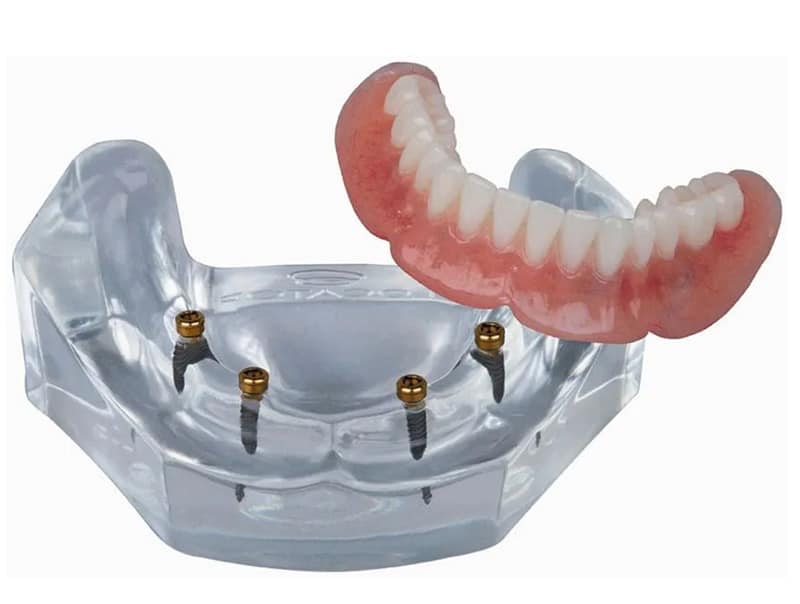
Process of Snap on Dentures
The steps are involved in the process of placement of snap-on dentures are:
- Implant Placement Procedure - After all remaining teeth are removed, and other required treatments are done, the implants are inserted into the jawbone. The implants usually are not noticeable after this. They can stay intact in your jaw for 4-6 months for your bone to attach to them (osseointegration).
- Post-treatment - We'll see you back for an initial post-operative consultation, usually the day after your surgery. In this appointment, we will examine your mouth, make sure that no infections are developing around the surgical site, and answer any questions you might have. We will also check the fitting of the dentures.
- Soft liners / soft liners - soft liners are cushioning agents placed in your denture to fill the space between dentures and gums and facilitate better healing. They enhance the fit and feel of your dentures.
- Uncover of implants - Implants get covered by the soft tissue. So, during this step, a small surgical procedure is done to expose the implants. Then a tiny healing abutment is placed on top of the implants to facilitate better growth of gum tissues around the implants. Our dental team will prepare your overdenture too.
- Attachment of implants to dentures - We'll adjust your healing abutments for your denture abutments and take the appropriate steps to connect your dentures to your dentures. Usually, this move can be completed in one day, but sometimes it can take a little longer.
7 Benefits that make implant-supported dentures superior to traditional dentures
There are many benefits of replacing a missing tooth with a dental implant over other options. They are:
- Better Stability – As implant-supported dentures are anchored in bone with dental implants, they have higher stability than traditional dentures.
- Increased chewing power – Implant-supported dentures are secured into the jawbone. They facilitate better stability to the dentures and thus, increase the chewing ability of the patient
- Better nutrition – The stability of implant-supported dentures enables better chewing efficiency of the patients. This allows patients to eat healthier and balanced food.
- Increased confidence – Implant-supported dentures are more secure with anchorage from implants in the jawbone. This reduces the looseness of the dentures and, as a result, prevents mishaps like slipping of dentures while speaking, laughing, etc.
- Better functionality – Secureness of the implant-supported dentures facilitate speech, smiling, and other social abilities.
- Increased quality of life – Stability of implant-supported dentures increases functionality and chewing power efficiency of the patient. Consequently, the quality of life of the patient is enhanced.
- Greater comfort – Unlike traditional dentures, implant-supported dentures do not cover large surface areas of the mouth. As a result, they increase the convenience of the patient and reduce gagging.
Disadvantages of traditional dentures
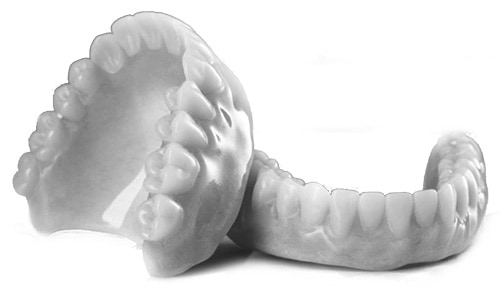
Before/After Snap on Dentures
From Our Real Patients
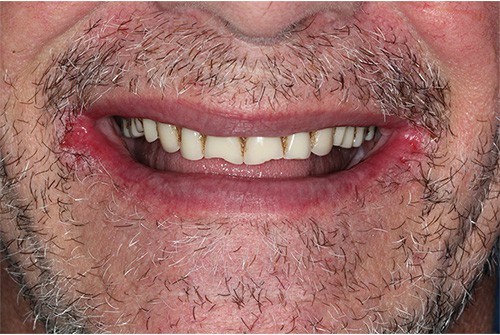
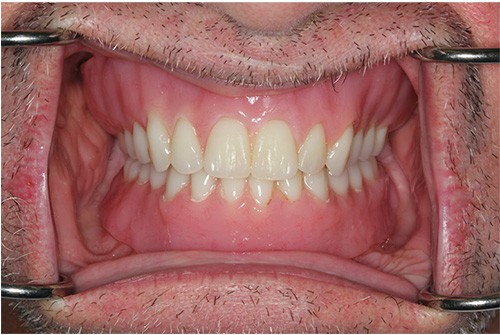
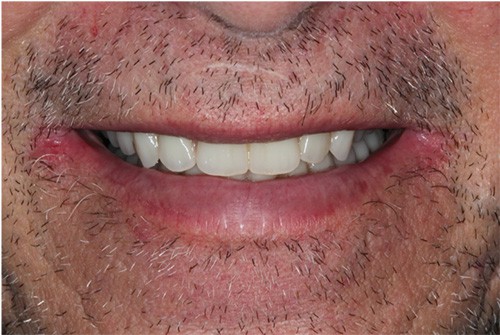
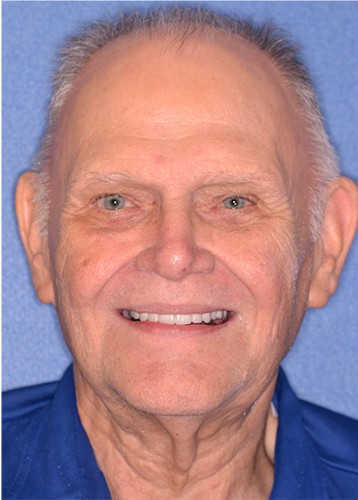
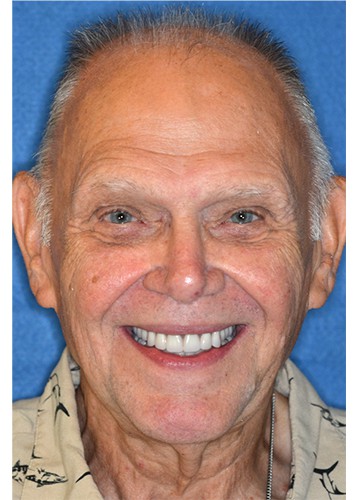
Frequently Asked Questions on Snap-on Dentures
Why should I prefer implant-supported dentures?
Generally, traditional dentures look good and are the most economical way to replace missing teeth. However, they have compromised functionality and stability. So, implant-supported dentures can help in overcoming the shortcomings of the traditional dentures.
smoke suffer from bone loss problems may not be good candidates for
dental implants. Dr. Adatrow will provide you professional guidance for
choosing the ideal treatment.
Am I eligible for snap-on dentures?
Yes, almost all patients are eligible candidates for snap-on dentures in Mississippi. To assess your oral conditions, schedule an appointment with us. Our dental team will take your medical, family, and habit history in detail. Dr. Adatrow will visually inspect and thoroughly examine your mouth. You might have to go for a three-dimensional scan for us to understand your bone structures.
What is alveoloplasty? Why is the alveoloplasty required?
Alveoloplasty is a surgical operation that reshapes and smoothes out the jaw where a tooth or teeth has been removed or lost. The portion of the jawbone that has the teeth is called alveolus, and "plasty" means reshaping, meaning that alveoloplasty is the process of molding or reshaping the jaw.
When teeth are lost due to damage or removal, a hole is left in the jawbone. As gums heal, they are going to do so unevenly to conform to the wound contours that rise and drop. This causes difficulties with any form of rehabilitation, such as dentures, which can cause unevenness, soreness, and pain. For dentures, an alveoloplasty is needed to prepare the jawbone for dental implants. The surface of the bone would need to be adjusted to an exact shape or level.
Will I be given mini-dental implants for snap-on dentures?
No, Dr. Adatrow prefers to provide conventional implants because conventional implants better success rate when compared to mini implants.
Will my speech be affected by snap-on dentures?
Snap-on Dentures can change the way you talk. It all depends on the situation, sometimes it's just a little bit, and sometimes there's much difference. However, this problem is standard because when you lost your teeth, your voice kept changing, and you never realized.
With snap-on dentures, you'll have all your teeth full, without any spaces to change the tone of your speech so that you will get back your original voice. For the dental implants to be successful, try not to put too much force or pressure on the implant site. Do not apply too much stress while healing. Also, strictly follow your dental appointments. Follow-ups are a must!
Visiting your dentist should not stop after the surgery is done. Schedule periodical checks with Dr. Adatrow to see if any infections are hampering the healing process. He will check if the implant has fused with the surrounding bone to assess the success of the surgery.
With snap-on dentures, you'll have all your teeth full, without any spaces to change the tone of your speech so that you will get back your original voice. For the dental implants to be successful, try not to put too much force or pressure on the implant site. Do not apply too much stress while healing. Also, strictly follow your dental appointments. Follow-ups are a must!
Visiting your dentist should not stop after the surgery is done. Schedule periodical checks with Dr. Adatrow to see if any infections are hampering the healing process. He will check if the implant has fused with the surrounding bone to assess the success of the surgery.
How many implants are required for my dentures?
Dr. Adatrow will assess your bone structure, density, and oral tissues before deciding the number of implants you might need to support your dentures. However, commonly, you might need a minimum of 4 implants in the upper jaw and a minimum of 2-3 implants in the lower jaw.



